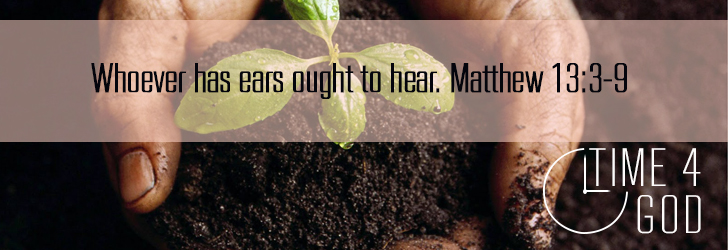Whoever Has Ears Ought to Hear
Like well-crafted poems, Jesus’ parables reveal to us what has always been before us, but that we had not seen clearly until we were suddenly aware enough to truly “hear” them.

A sower went out to sow and as he sowed, some seed fell on the path, and brides came and ate it up. Some fell on rocky ground, where it had little soil. It sprang up at once because the soil was not deep, and when the sun rose it was scorched, and it withered for lack of roots. Some seed fell among thorns, and the thorns grew up and choked it. But some seed fell on rich soil, and produced fruit, a hundred or sixty or thirtyfold. Whoever has ears ought to hear. – Matthew 13:3-9
We are always struck by the simple power of Jesus’ parables. Like well-crafted poems, Jesus’ parables reveal to us what has always been before us, but that we had not seen clearly until we were suddenly aware enough to truly “hear” them. They wake us up. For the truth of the matter is that most of us are asleep at the wheel more often than not. This sudden shock of awareness is not unknown to us. All of us have experienced it from time to time. It is that flashing moment of insight, the moment of revelation that fills us with wordless awe, that suddenly opens our eyes to the truth and rattles us in the very depths of our souls.
[content-ad]
Jesus uses a lot of farming images in his parables. Those images would be very familiar to the people of his time. For post-modern people, most of whom live in cities and have never set foot on a farm, who think that food comes from the grocery store, these images might seem “quaint”. But the idea of planting a seed is still familiar to most who have tended a flower bed, or made a small kitchen garden in their yard, or in a planter box on a window sill. Most know that it takes good soil to bring forth the hoped for flower, or tomato.
As we adults know, the “seed” is God’s word, Jesus, and the ground that it falls on is ourselves. That seed will not take root in one who has become so worldly that he or she can no longer ‘hear’ the word of God. They have, instead, become unquestioning “wisdoms” unto themselves alone. The post-modern relativist, materialist, or sophist might be a good example of this. They are those who believe that they are the masters of their own destinies, the sole determiners of what is right and wrong. The seed that is the word of God simply is not even heard, not recognized in such as these. As for the seed that falls on “rocky ground,” because it is shallow soil, it springs up quickly. In the beginning it is full of enthusiasm, but because of its shallowness it cannot survive the heat of the sun and dies just as quickly. This is the emotional convert who, in the emotional enthusiasm of the moment, gives his or her self to God, but when the challenges and storms of doubt come, as they inevitably will, he or she falls away just as quickly, because he or she finds that the actual “living” of one’s faith is “too hard.” Their faith has no roots. Then there are those people who have accepted the word of God, but who are still among the “thorns” of the world and have not yet learned to steal themselves against those thorns. When the temptations of immediate gratification come, they give in to them and their faith is choked and withers and dies.
Then there are those who have “ears,” those who have not just heard with their ears but with their consciences and their eternal souls, those who have been tested by worldly things and seen them for what they really are, who have become “rich soil”. They have not only “heard” the word of God, but they have accepted it into the very depths of their being. These have heard the truth and “seen” it with their whole hearts, minds, bodies and souls. They have come to desire it, with their whole hearts, minds, bodies and souls. What is it that they have heard and seen? Nothing less than the fecund, life-giving Word of God. They have been nurtured and matured in the Word of God and their compassionate, forgiving, self-sacrificing deeds among the people of God brings others to that same word.
In the end, the type of soil we are is a matter of the countless choices that we make in our lives. Jesus is telling us here that if we have ears, we ought to hear the truth of this parable. If, in “hearing” the truth of this parable, I realize I have allowed myself to become the trampled, infertile soil of the path, or the rocky soil, or the soil that is threatened by thorns, I have a choice. I can choose to continue in that way and in the end perish, or I can choose to become the “rich” fertile soil that can not just receive the seed, but let it grow a hundred, or sixty, or thirtyfold in my loving submisson to the fertile, empowering and liberating Word of God. Jesus wants us to hear this parable and its wisdom for us. Which, then, will it be for us? This sower has eternal patience. This Jesus is the seed that has been sown among us. We must ask ourselves, “What kind of soil am I?” “What kind of soil do I dearly want to be?” These are the things we ought to be moved to “hear” in Jesus’ parable.
SKM: below-content placeholderWhizzco for FHB

